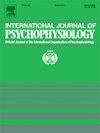Does level of cognitive load affect susceptibility?
IF 2.5
3区 心理学
Q3 NEUROSCIENCES
引用次数: 0
Abstract
We compared how different levels of cognitive load affect frontal P3 (fP3) Event-Related Potential (ERP) to novel sounds. Previous studies demonstrated the predictive value of the probe-elicited frontal P3 (fP3) ERP for subsequent detection failures. They also demonstrated how fP3 is reduced when performing visual and/or manual and/or cognitively demanding tasks. These results are consistent with fP3 indexing orienting to novels or, more neutrally: susceptibility. Here, we tested how fP3 is affected by a threefold variation of cognitive load induced by the verb (generation) task. Participants heard a noun and either listened to it, repeated it, or generated a semantically related verb. These conditions were manipulated between groups. One group (N = 16) experienced the listen and repeat condition; the other group (N = 16) experienced the listen and generate condition. When fP3 was probed 0 or 200 ms after noun offset, it was reduced (relative to no noun) only while repeating or generating, not while listening. An additional probe-elicited ERP was identified as novelty-related negativity, and its contaminating influence on fP3 estimation accounted for by a novel vector-filter procedure. We conclude that cognitive load does not affect fP3-indexed susceptibility. Instead, fP3-indexed susceptibility is affected by presentation of the stimulus, with the most pronounced effect in conditions where a vocal response is needed (i.e., repeat or generate, but not listen), independent of the complexity of the response.
认知负荷水平会影响易感性吗?
我们比较了不同认知负荷水平如何影响对新声音的额叶 P3(fP3)事件相关电位(ERP)。以往的研究表明,探针激发的额叶 P3(fP3)ERP 对随后的检测失败具有预测价值。这些研究还证明了在执行视觉和/或手动和/或认知要求较高的任务时,fP3 是如何降低的。这些结果与 fP3 对小说的导向性或更中性的易感性指标相一致。在此,我们测试了fP3如何受到动词(生成)任务所引起的认知负荷的三重变化的影响。参与者在听到一个名词后,要么听它,要么重复它,要么生成一个语义相关的动词。这些条件在各组之间进行调节。一组(16 人)体验听和重复条件;另一组(16 人)体验听和生成条件。当在名词偏移后 0 或 200 毫秒探测 fP3 时,只有在重复或生成时 fP3 才会降低(相对于无名词),而在听时不会降低。另外一种探针诱发的 ERP 被确定为与新奇相关的负性,其对 fP3 估计的污染性影响可通过一种新颖的向量过滤程序加以解释。我们的结论是,认知负荷不会影响以 fP3 为指数的易感性。相反,fP3-指数易感性会受到刺激呈现的影响,在需要发声反应(即重复或生成,但不是聆听)的条件下,这种影响最为明显,与反应的复杂性无关。
本文章由计算机程序翻译,如有差异,请以英文原文为准。
求助全文
约1分钟内获得全文
求助全文
来源期刊
CiteScore
5.40
自引率
10.00%
发文量
177
审稿时长
3-8 weeks
期刊介绍:
The International Journal of Psychophysiology is the official journal of the International Organization of Psychophysiology, and provides a respected forum for the publication of high quality original contributions on all aspects of psychophysiology. The journal is interdisciplinary and aims to integrate the neurosciences and behavioral sciences. Empirical, theoretical, and review articles are encouraged in the following areas:
• Cerebral psychophysiology: including functional brain mapping and neuroimaging with Event-Related Potentials (ERPs), Positron Emission Tomography (PET), Functional Magnetic Resonance Imaging (fMRI) and Electroencephalographic studies.
• Autonomic functions: including bilateral electrodermal activity, pupillometry and blood volume changes.
• Cardiovascular Psychophysiology:including studies of blood pressure, cardiac functioning and respiration.
• Somatic psychophysiology: including muscle activity, eye movements and eye blinks.

 求助内容:
求助内容: 应助结果提醒方式:
应助结果提醒方式:


